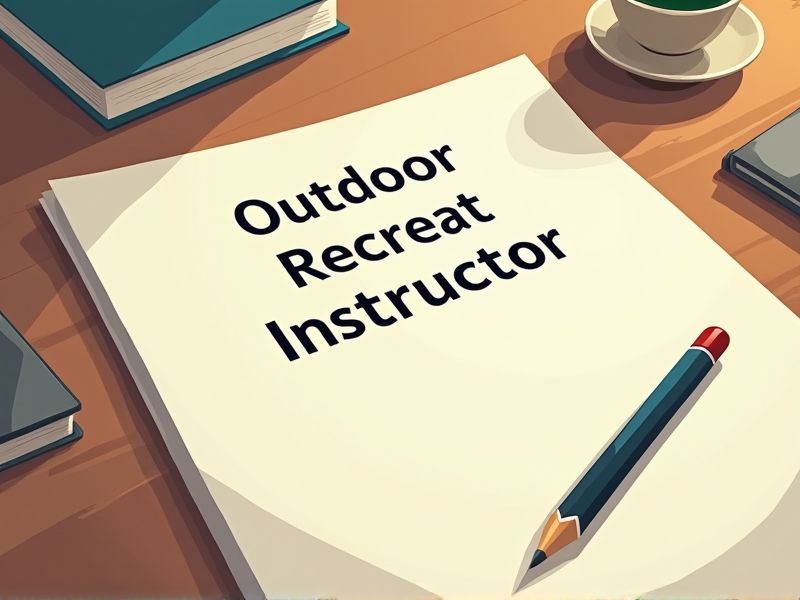
Outdoor Recreation Instructors engage participants in various activities that can be both physically challenging and potentially hazardous. Certifications ensure that instructors possess the necessary skills to manage risks effectively, enhancing both safety and participant confidence. These qualifications often cover areas such as first aid, survival skills, and activity-specific competencies. Here are some important certifications required for becoming an Outdoor Recreation Instructor.
Wilderness First Responder Certification
Wilderness First Responder Certification equips outdoor recreation instructors with critical medical skills necessary for responding to emergencies in remote areas. This training enhances their ability to assess, stabilize, and manage health situations where definitive medical care is delayed. Instructors with this certification can significantly improve safety standards and participant confidence during outdoor expeditions. Meeting industry standards, this credential often becomes a requirement for professional advancement and employment in outdoor education settings.
CPR/AED Certification
Outdoor recreation instructors often encounter unpredictable environments where medical emergencies such as sudden cardiac arrest can occur, necessitating quick, lifesaving interventions. CPR/AED certification equips instructors with the vital skills to provide immediate care, increasing the survival chances of individuals experiencing cardiac distress in remote areas. This certification demonstrates a commitment to safety and enhances the trust and confidence of participants in the instructor's ability to manage emergencies. Certification requirements often align with organizational and governmental safety standards, ensuring legal compliance and reducing liability risks for recreational programs.
Basic First Aid Certification
Outdoor recreation instructors often lead groups in environments where medical assistance may be distant, so possessing a basic first aid certification equips them to handle emergencies promptly. This certification ensures instructors can assess, stabilize, and treat minor injuries, reducing the risk of complications before professional help arrives. Trained instructors instill confidence in participants, as they demonstrate preparedness for unforeseen incidents. The ability to respond effectively can significantly enhance overall safety during outdoor activities, leading to a more enjoyable experience for everyone involved.
Leave No Trace Trainer Certification
The Leave No Trace Trainer Certification is crucial for outdoor recreation instructors to equip them with effective techniques to minimize human impact on nature. Certified trainers are adept at teaching principles that help preserve natural environments, ensuring sustainable outdoor experiences. As more people engage in outdoor activities, trained instructors play a vital role in reducing ecological damage. Instructors with this certification can effectively advocate for responsible outdoor ethics, promoting long-term environmental health.
Outdoor Leadership Certification
Outdoor Leadership Certification ensures that instructors possess the necessary skills to safely guide participants in various outdoor settings. This certification provides instructors with a standard understanding of risk management, crucial for minimizing potential hazards. Having certified leadership can enhance the credibility of organizations offering outdoor recreation programs. By receiving this certification, instructors demonstrate their commitment to professionalism and competence in their field.
Risk Management for Outdoor Recreation Certification
Outdoor recreation instructors face unpredictable natural environments, which increases the potential for accidents, making risk management certification crucial for ensuring participant safety. Certification equips instructors with skills to identify hazards and implement safety protocols, reducing the likelihood of incidents. Liability concerns necessitate that instructors demonstrate due diligence and competency through recognized risk management training. Confidence in instructors' ability to manage emergencies enhances participants' overall experience and trust in recreational programs.
Rock Climbing Safety and Rescue Certification
Obtaining a Rock Climbing Safety and Rescue Certification equips instructors with essential skills to handle emergencies, ensuring climbers' safety. Knowledge from the certification enhances risk assessment capabilities, reducing potential accidents during outdoor activities. Having certified instructors boosts participants' confidence in the program, attracting more enthusiasts and promoting a safer climbing environment. Certification compliance aligns with industry standards, upholding the organization's reputation and legal responsibilities.
Swift Water Rescue Certification
Outdoor recreation often involves activities near or on water bodies, which can pose drowning risks. Swift Water Rescue Certification equips instructors with essential skills to respond effectively in water emergencies. Certified instructors can better ensure participant safety, enhancing trust and credibility in their programs. Legal and organizational standards often require such certifications to mitigate liability concerns.
Avalanche Safety Certification
Avalanche safety certification enhances an instructor's ability to assess terrain risks accurately, which directly affects participant safety during winter activities. Instructors with this certification are equipped with knowledge and skills needed for emergency response, reducing the likelihood of fatalities in avalanche-prone areas. Possessing a certification demonstrates trustworthiness to clients seeking guided experiences, thereby increasing both credibility and potential clientele for instructors. Ensuring compliance with industry standards regarding avalanche safety supports legal accountability and minimizes organizational liabilities.
Environmental Interpretation Certification
Certification in environmental interpretation equips outdoor recreation instructors with essential skills to effectively communicate complex ecological concepts to the public. This training enhances their ability to engage participants, fostering a deeper appreciation and understanding of the natural environment. As a result, participants are more likely to adopt sustainable practices and support conservation efforts. Certification ensures instructors maintain a consistent standard of knowledge and communication, benefiting both instructors and nature enthusiasts.
Summary
By obtaining certifications, you increase your credibility as an Outdoor Recreation Instructor, which can lead to more job opportunities. Certifications often improve your skills and knowledge, enhancing your ability to ensure safety and enrich participant experiences. With credentials, you may gain access to specialized programs and networks, fostering professional growth. Your clients or employers likely have more trust in your expertise, resulting in greater satisfaction and repeat business.
